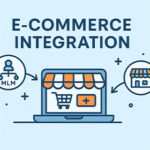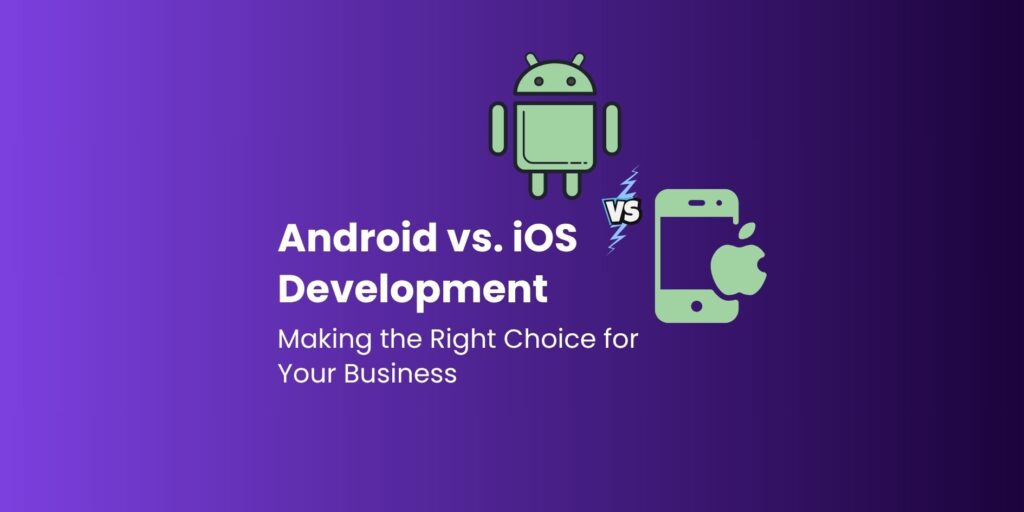Let’s face it – mobile apps aren’t optional anymore. Whether you’re running a startup or growing an established brand, choosing the right mobile app development platform is one of the first big decisions you’ll make. In the U.S., where smartphone use is sky-high, the Android vs iOS debate is still going strong and for good reason.
So, which one should you go with? This guide breaks down the real-world differences between Android Development and iOS Development, so you can make the right call for your business and see a solid return on investment.
Why Your Platform Choice Matters: Android vs iOS
Your mobile platform determines everything from development costs and audience reach to revenue potential and time-to-market. It also affects long-term support, maintenance, and scalability. The wrong choice can limit your app’s growth and user adoption while the right one can accelerate your digital success.
Android vs iOS: At a Glance
Before diving deep, here’s a quick comparison of the two major platforms.
|
Feature |
Android Development |
iOS Development |
|
Market Share |
~70% globally |
~28% globally |
|
USA Market Share |
~45% |
~55% |
|
Programming Language |
Kotlin, Java |
Swift, Objective-C |
|
Development Tools |
Android Studio |
Xcode |
|
App Store |
Google Play Store |
Apple App Store |
|
Approval Process |
Faster |
Strict and longer |
|
Customization |
Highly flexible |
More restrictive |
|
Device Fragmentation |
High |
Low |
|
Monetization Potential |
Ads-focused |
In-app purchases/subscriptions |
Target Audience: Know Where Your Users Are
Your ideal platform starts with knowing your audience.
- If your target market is North America or Western Europe, iOS often holds a slight edge in user base and spending power.
- If you’re targeting global markets (Asia, Africa, South America), Android dominates in user volume.
Tip: For U.S.-based startups or brands, iOS offers a more premium user base. But Android gives broader reach if scalability is key.
Development Costs: Budget Planning for Android vs iOS
Cost is often a decisive factor. Here’s what to expect:
- iOS development is typically faster and less complex due to fewer devices and screen sizes. That means lower initial costs.
- Android development often involves more time for testing and optimization, which may increase development costs slightly.
However, this doesn’t mean Android is more expensive overall. Development costs depend on app complexity, features, and team expertise.
Looking to keep costs optimized? Consider working with a reliable iOS app development company or Android app development company that offers transparent pricing and agile execution.
Time to Market: Speed Can Be a Competitive Edge
- iOS apps usually reach the market faster due to fewer device variations and a standardized environment.
- Android apps take longer because of device diversity and additional testing required.
So, if speed is a top priority, iOS might give you the edge especially for MVPs (Minimum Viable Products).
Revenue Model: Monetization Differences
When it comes to earning through your app, here’s how they differ:
iOS Monetization
- Users are more likely to pay for apps or make in-app purchases.
- iOS apps earn more revenue per user.
- Ideal for subscription-based services, SaaS, and premium tools.
Android Monetization
- Dominates ad-based revenue models.
- Reaches a larger audience, especially in emerging markets.
- Better for apps targeting massive adoption (e.g., social, utilities, freemium models).
Choose iOS if your strategy is quality-driven monetization. Choose Android for scale and volume-based growth.
Device Ecosystem: Fragmentation vs Uniformity
Android Development
- Needs to support a big range of devices, screen sizes, and OS versions.
- Requires additional testing and optimization.
- Offers opportunities on wearables, TVs, and even embedded devices.
iOS Development
- Limited to iPhones, iPads, and a few other Apple devices.
- Easier to optimize.
- Offers a more controlled and uniform experience.
If your app needs hardware-level customization or flexibility, Android is your platform. For polished, consistent UI/UX, iOS shines.
Maintenance and Updates
- iOS users need to upgrade to the latest OS quickly, simplifying update rollouts.
- Android has slower adoption of new versions, requiring broader backward compatibility.
This affects how you handle post-launch support, bug fixes, and feature rollouts.
Security and Privacy Considerations
iOS is often favored for:
- Strong data encryption.
- Tight App Store guidelines.
- Better privacy settings.
Android also offers robust security, especially in newer OS versions, but the open-source nature increases the risk of fragmentation and inconsistent patching across devices.
For apps handling sensitive data (e.g., finance, healthcare), iOS may provide a stronger security foundation though both can be hardened by experienced developers.
Development Tools and Talent Availability
- Android Studio (Android) and Xcode (iOS) are both mature, powerful environments.
- Both platforms offer excellent SDKs, testing frameworks, and debugging tools.
- It’s easier now to hire Android app developers or hire iOS app developers with proven experience thanks to a growing global talent pool.
However, finding a partner that understands your business goals, not just the code, is critical.
So… Which Platform Should You Choose?
Choose iOS If:
- Your audience is primarily in the U.S., Canada, or Western Europe.
- You plan to monetize through subscriptions or in-app purchases.
- Your app requires tight security and polished design.
- You want to launch quickly with less device testing.
Choose Android If:
- You’re targeting global audiences, especially in developing countries.
- Your goal is mass adoption, freemium models, or ad revenue.
- You need flexibility in hardware integration.
- You want to build for multiple device categories (phones, tablets, TVs, wearables).
The Case for Cross-Platform?
In some situations, going cross-platform (using tools like Flutter or React Native) makes sense especially if:
- You want to test your product in the market fast.
- You have budget constraints.
- Your app doesn’t rely heavily on platform-specific features.
Still, for performance-heavy apps or those requiring deep system integration, native Android Development or iOS Development is the better long-term approach.
Action Steps to Get Started
- Define your target audience (geography, demographics, behavior).
- Outline your monetization model (ads, purchases, subscriptions).
- Set a realistic development timeline and budget.
- Decide between native and cross-platform based on complexity.
- Consult with experienced teams to validate your choice.
- Ready to build? Hire iOS app developer or hire Android app developer now to kick off development the right way.
Final Thoughts: It’s Not About iOS or Android — It’s About What Works for You
The Android vs iOS decision isn’t about which platform is “better.” It’s about which one fits your market, budget, and business model.
Take your time. Get expert feedback. Avoid rushing the process. A well-thought-out mobile strategy will save you time, money, and stress in the long run.
Whether you go Android, iOS, or both, mobile is where your users are. And if you’re still unsure, schedule a free consultation with the team at Quokka Labs. We’ll help you figure out exactly what fits your product vision and build it with precision.
- Android vs. iOS Development: Making the Right Choice for Your Business
- Choosing between Android and iOS? This guide compares costs, audience, monetization, and time-to-market to help you pick the best platform for your app.
- app development
Related posts:
 Top 5 Custom Software Development Companies in Edmonton 2025
Top 5 Custom Software Development Companies in Edmonton 2025
 Contrast Mapping for Dark Mode Accessibility in Taxi Booking Apps
Contrast Mapping for Dark Mode Accessibility in Taxi Booking Apps
 Boost Your Business with These App Development Companies in Kuwait
Boost Your Business with These App Development Companies in Kuwait
 How DevOps as a Service Accelerates Cloud Transformation for Modern Enterprises
How DevOps as a Service Accelerates Cloud Transformation for Modern Enterprises
 Retained vs. Contingent Search: Understanding the Value Dynamics Search Partners Brings to Each Model
Retained vs. Contingent Search: Understanding the Value Dynamics Search Partners Brings to Each Model
 Integrating MLM Software with E-Commerce Platforms: A Step-by-Step Guide
Integrating MLM Software with E-Commerce Platforms: A Step-by-Step Guide
 Integrating MLM Software with E-Commerce Platforms: A Step-by-Step Guide
Integrating MLM Software with E-Commerce Platforms: A Step-by-Step Guide
 The Wimbo Revolution: Transforming Real-World Friendships in 2025
The Wimbo Revolution: Transforming Real-World Friendships in 2025








